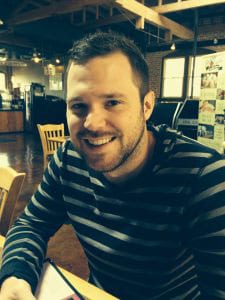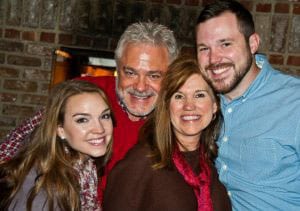 Aaron is a twenty-four year old college graduate living in Alabama. He’s an entrepreneur who majored in small business management. His father is a pastor and he has three siblings.
Aaron is a twenty-four year old college graduate living in Alabama. He’s an entrepreneur who majored in small business management. His father is a pastor and he has three siblings.
Sounds pretty normal right?
Shockingly, he, his grandmother, uncle, mother and both of his brothers, all have the rare autoimmune disease familial cold autoinflammatory syndrome (FCAS).
Unfortunately, all of them then went undiagnosed until just six years ago.
Even though so many of his family members have FCAS they never had a name for it. Aaron would often describe it to people as allergies or arthritis. It’s a habit he sometimes continues even after having a diagnosis because of the familiarity of those ailments and the rarity of what he actually has.
His family finally received their diagnosis because of Aaron’s eldest brother.
 “My oldest brother, Adam, had tried to go into the military as a pilot and the military diagnosed him with cold urticaria, which is not quite the same thing as FCAS. He was sixteen or seventeen year old, so I was about ten. He got interested in it again some years later, and found someone who has what we have. That was the first time we knew what to call it.”
“My oldest brother, Adam, had tried to go into the military as a pilot and the military diagnosed him with cold urticaria, which is not quite the same thing as FCAS. He was sixteen or seventeen year old, so I was about ten. He got interested in it again some years later, and found someone who has what we have. That was the first time we knew what to call it.”
The FCAS patient who his brother found online referred them to a specialist in Georgia and in 2010, Aaron had his first treatment. At the time of their first treatment Aaron was eighteen and his mother was fifty.
Aaron recalls playing soccer in high school in thirty-five degree weather and trying to beat the pain on a day to day basis. He says that there was significant improvement after he began receiving treatment. The downside is simply that since the treatment is an immune suppressant, he says he gets maybe an extra cold per year. He even went so far as to say the treatment makes it feel almost like he doesn’t have FCAS except, as he says, “I still have the mutated gene and if I quit the treatment it would all come back.”

The undiagnosed, untreated, FCAS meant a daily fight for Aaron.
Nonetheless, Aaron pushed through the pain and played soccer for thirteen years. He says “my parents raised all of us [to] not let it limit us in what we do. We grew up dealing with it.”
That’s funny because they dealt with a lot.
Any cold conditions caused a painful reaction. FCAS patients often experience swollen joints and rashes after exposure to the cold. Aaron remarked, “I developed a high pain tolerance.” He recalls soccer season starting in February at his school and playing in rainy, forty degree weather. He played through the pain for the game, but the next morning he couldn’t walk and had to miss school.
Aaron says FCAS was just a part of everyday life for him and his family and that he “learned how to put on a smiling face and continue on with the day.” but he emphasizes the improvement of having a diagnosis and a treatment.
“Growing up I was always a little different than other kids just because of how my body reacted, and I didn’t know what to call it, Being able to tell people what I have and share my story was a significant thing for all of us.”
His advice to other FCAS patients?
“Don’t let it keep you from doing what you want to do, what you love doing. It’s not fatal, put on some extra layers, see a specialist, and get treatment. I understand what it’s like to live with it and it’s not fun. I hope that if someone’s child has this they get the treatment and not go through what my family and I did. Don’t let it keep you from living your dreams and what you want to do in life.”
If you want to hear more from Aaron and his daily life, check out his blog Aaron’s Corner.
All images from Aaron



